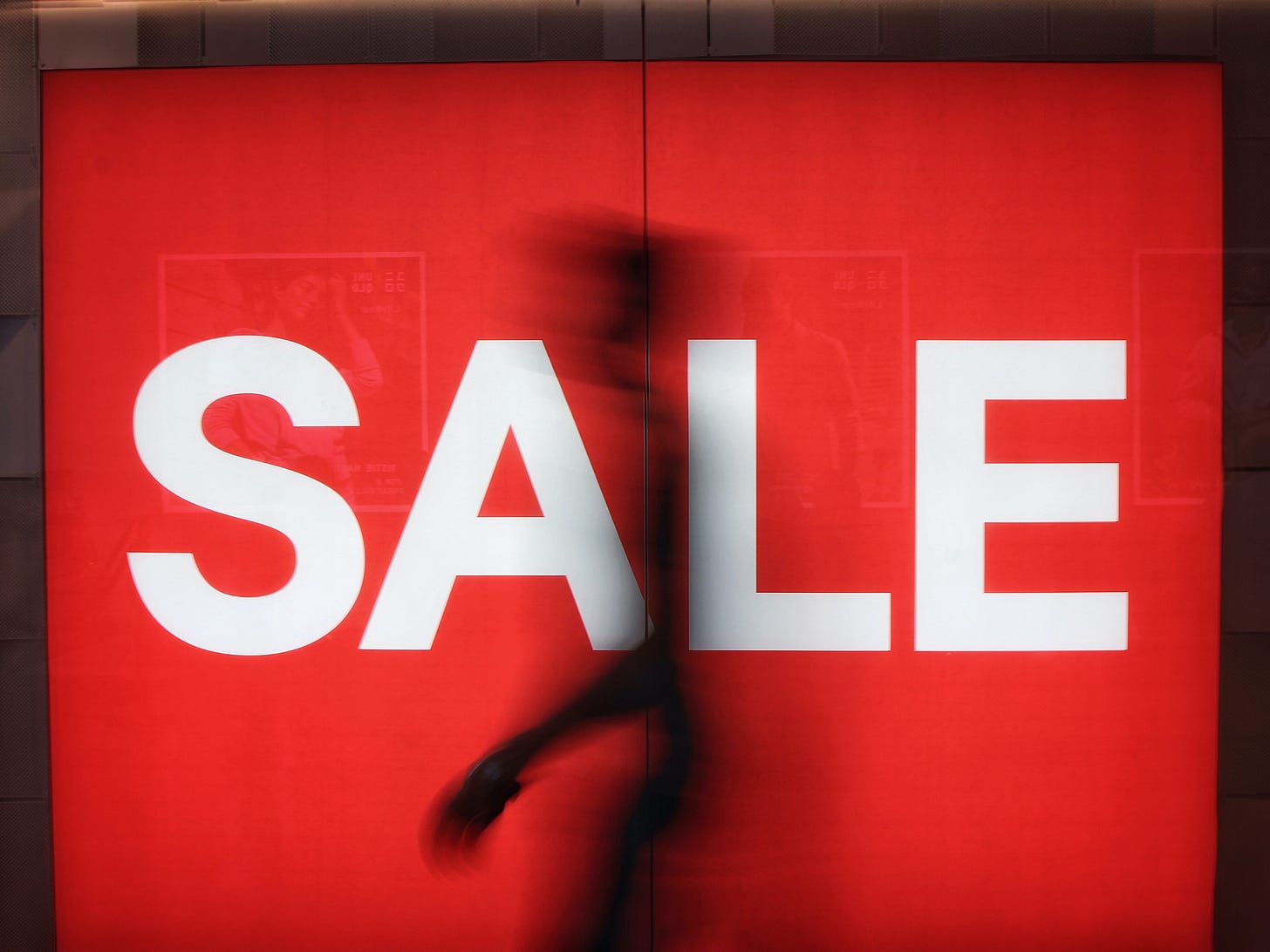Why You Need to Pray Your Way Through Black Friday
Reflecting on Neoliberalism's High holiday
I feel bad shopping on Black Friday, like I’m participating in a pagan holiday. The compulsion to shop on this particular day grips me, as it grips most of us, like a rapid on-set fever. The sheer desire is what unsettles me.
Of course, it’s not just Black Friday, shopping is the rhythm of holiday observance in the United States. “December to remember” implies that a truly memorable Christmas involves a new Lexus in the driveway. Labor Day is for traveling to new shopping locations. Columbus Day is for buying new major appliances. There are sales galore every 4th of July.
I’ve concluded that my feelings are well-founded. Black Friday is the high holiday of the world religion called neoliberalism. I want to emphasize the definite article—the world religion—because it seems to be the one thing that unites us across the globe. If there’s one way that western Christians are syncretistic, it's that we are all constantly tempted to bow down and worship the neoliberal god in hopes of inheriting the nations (cf. Matt 4:9).
I remember when I first heard the term “neoliberal” I was confused. I assumed it must have something to do with left-leaning politics, and probably some new brand of it (signaled by the “neo” prefix). I had heard that Hilary Clinton was a neoliberal, which confirmed my assumptions.
But that’s not quite right. The term is an economic one that doesn’t presume political platforms that lean right or left. “Liberal” in this case means “liberty” as in “freedom,” the ability to do as one pleases, economically speaking. To buy and sell limitlessly. The “neo” prefix signals the global order since, with the advent of the internet and the ability to hop on a flight from New York to Singapore, we live in a globalized economy.
It’s not Left or Right, but the term still has a political assumption, which is that countries ought to do politically whatever is deemed best economically. Fossil fuels are good because they keep the economy humming, and abortion saves black women from poverty. So the arguments go from Right and Left. Note that either way, the argument is that something is good because it makes sense money-wise.
But neoliberalism is an idol not strictly because it’s a global economic and political reality, but because it has become “the ordering rationale for all of life.” That’s how my friend Kevin Hargaden has put it.
We celebrate every holiday with shopping because we are told and we genuinely believe that buying more is good for the economy, and what’s good for the economy is good for us and the world. We shop when we’re happy, we shop when we’re sad. We shop when we’re bored, we shop when we’re busy. If there is any other way of referring to all of this than as idolatry, I’m open to it. But I can’t see it.
I think we’re at the point where most people readily acknowledge that it’s not all good. The realities of sweat shops and the wars that are started over, say, coltan, in the Democratic Republic of Congo, which is a necessary ore for all our mobile phones to work, are nearly impossible to escape. People are literally impoverished, poisoned, and murdered so that we can shop on and around every major holiday in the West. We acknowledge all of this, but don’t know how to get ourselves out of the mess we’re in. You’d think that we’d have realized by now that we can’t buy our way out of it. But we keep trying, hoping that eventually it will work. This is how neoliberalism keeps its grip: the solution is always more of the same.
So what shall we do? That’s the question the crowd asked John the Baptist when he warned them of the consequences of their idolatry. He told them to share their extra jackets and left over bread with those who had none (see Luke 3).
There’s a lot to say about what we can and should do, more than I can say here. But let me make one recommendation. As my friend Kevin Hargaden himself says, we can’t withdraw from the world we live in. So, if you are going to shop on Black Friday, then shop prayerfully. Take one item that you buy, and find out where it was made (probably China). Then pray for the person/people who made that item. Pray for the factory workers. Pray for the local truck drivers. Pray for the lowest level employees in the shipping company that carry it across the sea. Pray for the plane pilots, and the semi drivers on US interstates. Pray for the receiving company forklift drivers. Pray for the shelf stockers and the cashiers at the store you’re buying from.
Pray that they’d all have the jackets and bread that they need.
Finally, thank God for what you hold in your hands.
The reason I recommend this is because our problem really is an idolatrous one. The solution to idolatry is not to make our idolatry more ethical, but to forsake idolatry altogether. The only way to do that is to turn to the one true God, and that begins in prayer. We don’t need to defeat the apocalyptic beasts the merchants of Babylon worship (Rev 18:11).
God will do that.





Just got around to reading this, for a few reasons. And well said, I actually smashed my iPhone intentionally to set my self free from everything the world had to offer. But most of all the time it was consuming from my life. Now, I have more time to focus and dive deeper in my relationship with God and those He places around me. I love the way you wrapped it all up. We serve a God that works through every means possible. So why not pray and give thanks for truly everything we have. May God continue to bless you and give you wisdom.
Brilliant as usual.